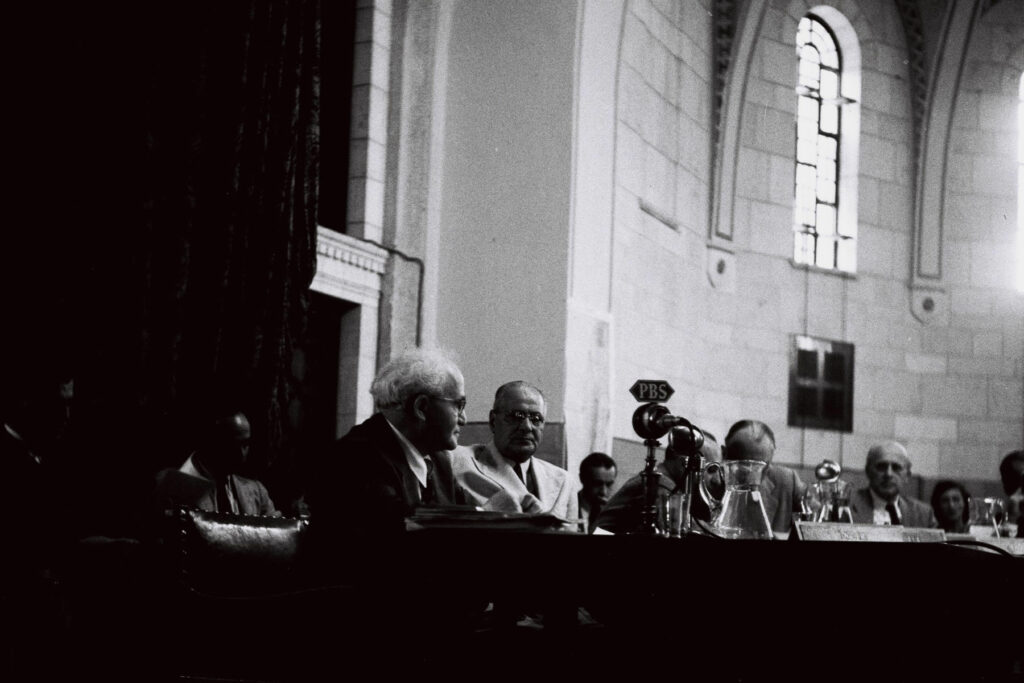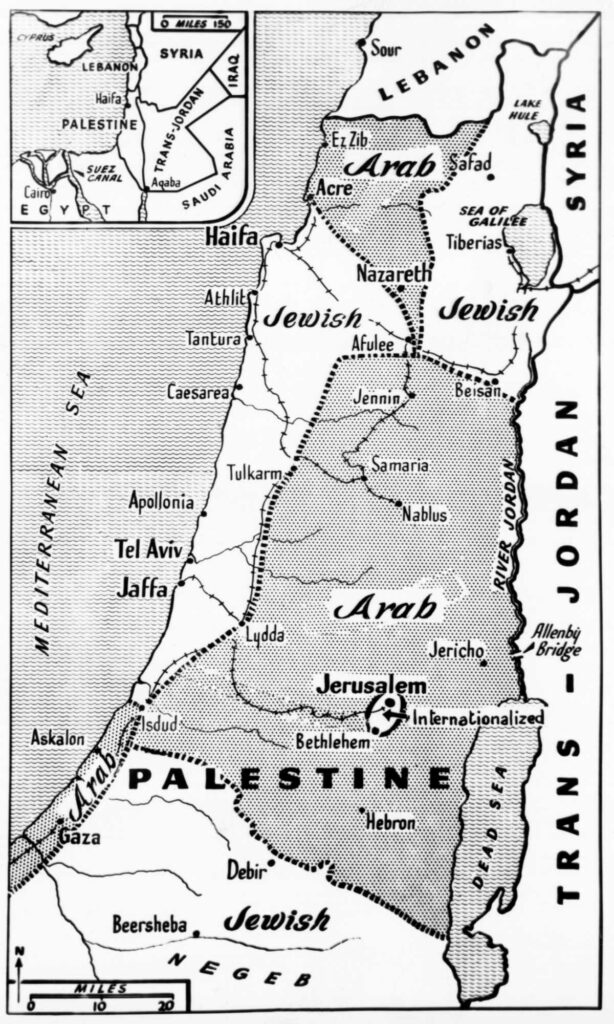Michael Lynk served as the United Nations Special Rapporteur for human rights in the occupied Palestinian territory, from 2016 to 2022. He is a non-resident fellow at DAWN.
Partition enjoyed a high season in 1947. India was partitioned into two countries—which later became three—at midnight on Aug. 15, with the boundaries between India and Pakistan determined by a British imperial commission chaired by an English solicitor who had never previously been to the subcontinent. And on Aug. 31, the United Nations Special Committee on Palestine, or UNSCOP, issued its report to the U.N. General Assembly, unanimously calling for an end to the British mandate of Palestine—and with a majority of the committee members recommending the partition of Palestine into separate Jewish and Arab states, along with the internationalization of Jerusalem. The majority plan became the basis for the General Assembly's decision to partition Palestine three months later. None of the 11 members of the U.N. committee had visited Palestine, or indeed knew much about it, before their appointments.
The partitions of India and Palestine would lead to brutal wars and mass expulsions, both immediately and in the decades to come, resulting today in a cold peace on the subcontinent between India and Pakistan, and a permanent Israeli occupation in Palestine. In her 1959 poem, the American author and critic Marya Mannes would write:
Borders are scratched across the hearts of men
By strangers with a calm, judicial pen
And when the borders bleed we watch with dread
The lines of ink across the map turn red.
The British empire had plenty of experience with partition. It imposed artificial borders on Ireland in 1921. In the late 19th century, it separated the Pashtuns—half in what is now Pakistan and half in Afghanistan—by the Durand Line, which was negotiated by a secretary of Britain's colonial government in India and the British-backed emir of Afghanistan. The Sykes-Picot Agreement between Britain and France divided up the Levant into new frontiers following World War I and the collapse of the Ottoman Empire, defying Arab aspirations for independence. And building on this blueprint, Cold War-era and late colonial partitions were drawn by Britain, the United States or other respective powers in Germany, Korea, Vietnam and Cyprus.
But the partition of Palestine was the first major decision of the fledgling United Nations, its first major crisis and, quite arguably, its first major misstep. Brian Urquhart, the British diplomat who helped launched the U.N. and later oversaw all of its peacekeeping missions, said in his memoirs that "the Palestine problem has haunted the development of the United Nations ever since 1948." The U.N.'s involvement in Palestine, he lamented, "has twisted the organization's image and fragmented its reputation and prestige as no other issue has."

When the British conquered Palestine from the Ottomans near the end of World War I, and subsequently assumed a League of Nations mandate to, in theory, guide it to independence, the country was 93 percent Arab. The European Zionist movement, although representing only a minority of European Jewish opinion in the early 20th century, had secured the Balfour Declaration from the British government in 1917, supporting "the establishment in Palestine of a national home for the Jewish people." Zionist leaders successfully lobbied to have the declaration inserted into the League of Nations' mandate for Palestine.
In essence, the goal of Zionism was to turn an Arab country into a Jewish one. As fascism rose in Europe, several significant waves of Jewish refugees and settlers arrived in Palestine, triggering revolts by Palestinian Arabs against the looming demographic transformation of their country. By the end of the 1930s, the Arab majority in Palestine had fallen to 70 percent. Zionist leader David Ben-Gurion acknowledged their fears. "What Arab cannot do his math and understand that [Jewish] immigration at the rate of 60,000 a year means a Jewish state in all of Palestine?" he wrote in a letter at the time.
The partitions of India and Palestine would lead to brutal wars and mass expulsions, both immediately and in the decades to come, resulting today in a cold peace on the subcontinent between India and Pakistan, and a permanent Israeli occupation in Palestine.
- Michael Lynk
An exhausted British government announced in early 1947 that it was submitting the Palestine problem to the United Nations. In response, the General Assembly established the UNSCOP to investigate the situation in Palestine and recommend a durable path for its future. The committee's 11 members were largely jurists or diplomats, coming from Europe (the Netherlands, Sweden, Yugoslavia and Czechoslovakia), British Commonwealth countries (Canada and Australia), Latin America (Guatemala, Peru and Uruguay) and southern Asia (Iran and India). American Ralph Bunche, who later won the Nobel Peace Prize in 1950, was appointed by U.N. Secretary General Trygve Lie as the committee's special assistant. In a letter to his wife, Bunche caustically wrote that this was "just about the worst group I have ever had to work with. If they do a good job, it will be a real miracle."
The committee spent six weeks in Palestine in June and July of 1947, holding both public and private meetings. The Arab Higher Committee, representing the leadership of various Palestinian organizations, boycotted the committee because, in its view, the duty of the U.N. was to declare the end of the British mandate and the immediate independence of Palestine. In 1947, Palestinian Arabs were still the overwhelming majority population at 66 percent, and popular sentiment desired a single independent state. Whether the Palestinian boycott decisively influenced the committee members is debateable. Imbued with an aversion to the underdeveloped and largely agrarian Palestinian economy, and shaped by a romantic view of settler colonialism, the European, Canadian and Latin American members of the UNSCOP came to regard Palestine as a backward society in need of modernization.
Adopting a different strategy, the Jewish Agency—the proto-government of the Jewish community in Palestine—appointed senior and skilled representatives to liaison with the committee and proved highly successful in shaping the views of many committee members. The committee not only met with Ben Gurion and Chaim Weizmann, but also with Menachem Begin, the head of the Irgun militia, who at the time was being hunted by the British for leading the Jewish insurgency in Palestine. Several committee members accompanied the Jewish Agency to watch the drama surrounding the arrival near Haifa of the Exodus, which was carrying 4,500 Jewish would-be immigrants to Palestine from France, many of them Holocaust survivors. Later, some committee members were escorted to displaced persons camps for Jewish refugees and Holocaust survivors in Germany and Austria. Both experiences, combined with a prevailing sentiment that the Jewish settler society in Palestine was dynamic and admirable, deeply influenced many of its members.

The Palestinians adamantly opposed partition, while the Jewish Agency pushed strongly for it. When the committee's members traveled to Geneva in August to write their report, six choices emerged. The committee rejected the concepts of a unitary Jewish state, a unitary Palestinian state, a binational state and a cantonized Palestine. Three members of the committee eventually supported a federal state, with autonomous political powers for Jews and Palestinian Arabs, a federal legislature, and Jerusalem as its capital. In their view, partition was an artificial solution that "could not possibly provide for two reasonably viable states." (Intriguingly, these three members came from countries—Yugoslavia, Iran and India—with significant or majority-Muslim populations).
Seven members supported the partitioning of Palestine into separate Jewish and Arab states, with an economic union—including a common currency, customs union, and transportation and communications systems—that would tie the two states and the international city of Jerusalem together. As justification, they stated that "the two intense nationalisms" make "partition . . . the most realistic and viable settlement." (One committee member, the Australian representative, abstained.) The majority plan was almost immediately rejected by the Palestinian leadership, while the Zionist General Council, which led the Zionist movement, voted overwhelmingly for it on Sept. 3, 1947.
In its detailed coverage of the UNSCOP report, The Economist in early September 1947 called the majority plan "both unjust and unworkable." The majority plan recommended that the Yishuv, the pre-state Jewish community in Palestine, which made up 34 percent of its population, be given almost two-thirds of the country's land area, both of its ports, most of its primary water sources and most of its valuable citrus plantations. At the time, the Yishuv only owned 7 percent of the land in Palestine. Almost all of Palestine's industries—Arab, Jewish and foreign—would be in the new Jewish state. Yet, under this plan, the Jewish state would still be demographically a binational state, with almost an equal population of Jews and Palestinian Arabs. For their part, the Palestinians were asked to accept a rump statelet with little of the country's economic wealth, and a heavy dependence upon the goodwill of the new Jewish state to make the proposed economic union functional.
Looking back at the U.N. report and subsequent partition resolution, one overriding lesson becomes clear: The partition of a country, against the fervent wishes of its majority indigenous population and for the benefit of a settler population, would not happen today.
- Michael Lynk
With modifications, the UNSCOP majority plan was adopted by the U.N. General Assembly on Nov. 29, 1947 in Resolution 181. The General Assembly vote was delayed several times because the United States and the Jewish Agency representatives were not confident that they had gathered the requisite two-thirds of U.N. member states to support the partition resolution. Only after significant diplomatic arm-twisting, and an abrupt change of mind by several developing countries, was the final vote conducted. While slightly more territory was assigned to the proposed Arab state by the General Assembly, the lopsided features of the UNSCOP majority plan remained largely intact.
The rest has been a calamitous history for the Palestinians. Looking back at the UNSCOP report and the subsequent partition resolution adopted by the General Assembly, one overriding lesson becomes clear: The partition of a country, against the fervent wishes of its majority indigenous population and for the benefit of a settler population, would not happen today. The United Nations in 1947 was largely a club of European countries, English white-settler states and Latin American countries ruled by colonial Spanish-descendent elites. Since then, the U.N. has more than tripled its membership, with former colonized countries from the developing world forming a solid majority in the General Assembly. And, in the intervening years, partition has acquired a seedy reputation in both political and academic circles as a pernicious solution to imperial and great-power problems.
In candid moments, even the British recognized this reality. "The best partition scheme, and the most favorable one that I have seen up to now, has the effect that it would leave … 450,000 Jews and 380,000 Arabs in that Jewish state," Ernest Bevin, the British foreign minister, remarked in 1947. "I put that to the Arabs quite frankly, and what was their answer? The Arabs say: 'If it is wrong for the Jews to be a minority of 33½ or 40 percent in the whole country, what justification is there for putting 380,000 Arabs under the Jews? What is your answer to that?' I have no answer."







